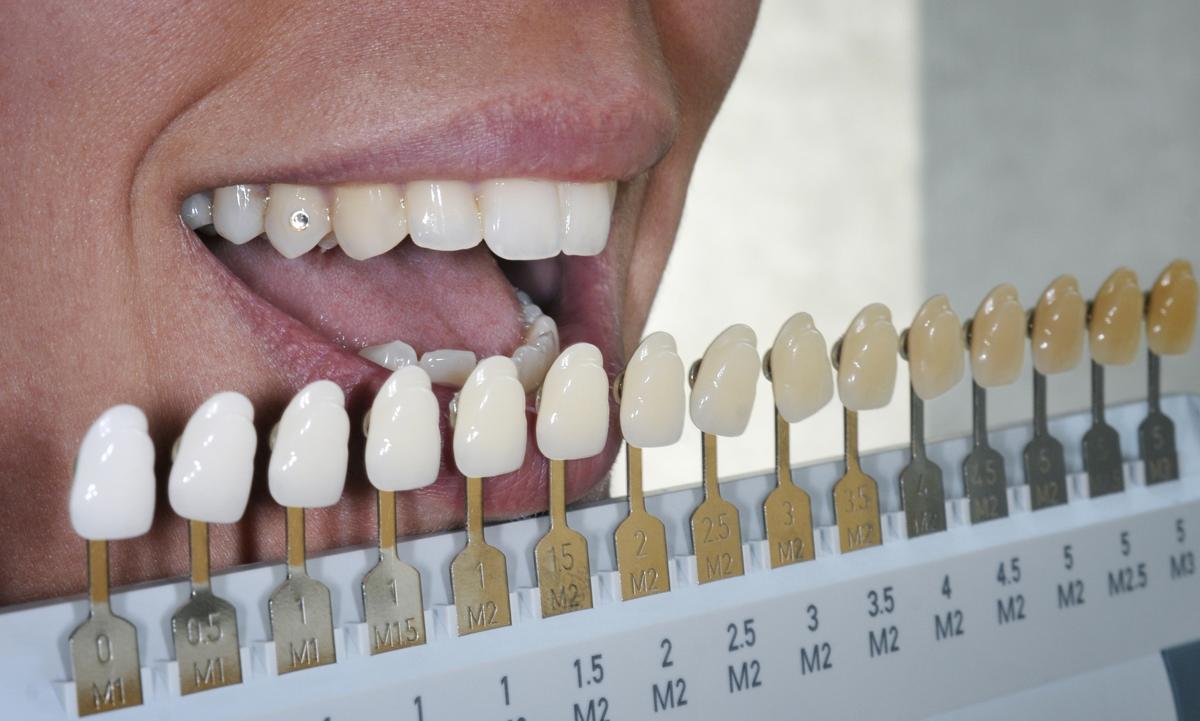
The cost of teeth bonding may vary from place to place. To know the average cost of the procedure, and the factors that determine the cost, you can refer to this HealthHearty article.
Cosmetic teeth bonding is but a small branch of the flourishing field of cosmetic dentistry. It is an excellent technique for repairing small spots, discoloration, teeth chips, and gaps between teeth. You can change the shape of teeth. If they are very short, you can make them look longer! In short, you can do all the things that can enhance the beauty of your smile.
Dental bonding is a procedure in which a tooth-colored resin material (a durable plastic material) is applied and hardened with a special light, which ultimately “bonds” the material to the tooth and restores or improves the person’s smile.
Teeth Bonding Procedure
To start with, the dentist decides the exact shade of your teeth in order to get the similar dental bonding material. After that, the affected tooth is made rough so that the bonding material can easily cling on to it. The next step in the tooth bonding procedure involves application of the composite material on your teeth. The material is made of tough synthetic resin (made from durable plastic that matches the color of your teeth). After applying it over the tooth, it is carved and shaped in order to create the perfect shape of the tooth. With a specific high-intensity light (ultraviolet light or laser), the mixture is hardened. It becomes tough like the real tooth. As the last step of tooth bonding, the tooth is buffed and polished well so that it doesn’t look odd and out of place with the other teeth. Usually, anesthesia is required if the bonding is used to fill a cavity in a decayed tooth. The whole dental bonding procedure takes about 30 to 60 minutes per tooth to complete. Teeth bonding is more like a part of the aesthetic dentistry. The reason for teeth bonding to be so popular is its cost, which is much more affordable than other dental processes like dental implants.
Teeth bonding is a one visit procedure, which means, one hardly requires a second visit to the dentist for the minor dental problems. The dentist may perform the teeth bonding process on your second visit to the clinic, as the first visit may be required for him to analyze and decide the details of the procedure (to determine the exact process that is required for your teeth and the exact color of your teeth). The number of visits also depends on the number of teeth that are needed to be bonded. This latter mentioned point can step in the determination of the cost too.
How Much Does Teeth Bonding Cost?
Normally, dental bonding costs relatively less than other dental beautification processes. The exact cost depends on a few things like the amount of material which is used for teeth bonding, and the kind of bonding which is required. The cost mainly depends on the number of teeth that are being repaired, and the location of the tooth being filled (front/back). The location of the clinic (big/small city), reputation of the doctor, etc., also play an important role in determining the cost of teeth bonding.
- The cost for resin-based composite fillings can be about $135 to $240 per filling. The average cost of amalgam fillings is about $110 to $200 per filling.
- For minor proceedings like correcting a chipped teeth and removing stains on teeth, you may have to spend somewhere around $100 to $300.
- Teeth bonding cost for filling the gaps between two teeth can be around $300 to $600.
- Charges for minor cosmetic smile corrections can be around $100 to $225.
- All in all, the average tooth bonding cost can range anywhere between $100 to $1000, as per the location, expertise, and reputation of the dentist, local rates, and the complexity level of the dental bonding process.
Teeth bonding is an easy as well as less expensive dental procedure, which is often performed without anesthesia (unless it is a decaying tooth). The composite bonds made in the teeth bonding process last for about 3 to 10 years. As this process falls under cosmetic dentistry, you would have to consult your insurance agency about the coverage of dental insurance for it. Dental colleges and some dental groups can offer schemes like partial payment for patients belonging to the low income group. An insurance plan may cover the cost of bonding, if it is done for structural reasons or to fill a cavity. Teeth bonding is a process of minor dental corrections. In case your teeth require some extensive repairing, the dentist may suggest other options like porcelain veneers or dental crowns.
To prevent chipping of the bonding material (this can even break off the tooth), one should avoid biting fingernails and chewing on hard objects like candies, pens, ice, etc. Similarly, the bonded teeth should not be used as an opener or a nut cutter.


